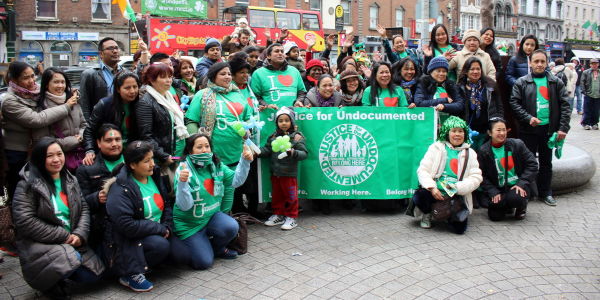Ireland’s undocumented migrants are living in fear of deportation, campaigners said.
A group of 1,400 workers and their families called for immigration reform at home as the political elite champions the cause of the Irish in the shadows in the US this St Patrick’s Day.
Filipino and Chinese people are among the most likely to become irregular in Ireland. Up to 20,000 are estimated to live in the country.
Justice for the Undocumented (JFU) said: “We’re here today to send a message to political leaders travelling to Washington: we need immigration reform here in Ireland too. We’re here to remind them that there are undocumented migrants in Ireland too.
“We’re here in solidarity with undocumented migrants everywhere, especially the undocumented Irish in the US this St Patrick’s Day.”
Lobbyists for reform held a Dublin street party on Sunday to highlight their cause.
“Today we stand strong in solidarity with undocumented migrants on both sides of the Atlantic.
“We are calling on our political leaders to act with integrity and think of their home country and the situation here as they travel abroad for St Patrick’s Day; to remember us as they ask US leaders to think of the Irish undocumented there.
“We too work hard in our adopted country, we too are unable to travel home for funerals and weddings, we too are simply asking for a chance to come forward and stop living in fear.”
Some migrants work as carers and child minders, others as cleaners.
Most have been in Ireland for more than five years and have found work.
Almost half are parents and more than half have third-level education.
Around 86% entered the country legally and subsequently became undocumented.
A regularisation proposal from the undocumented campaign group, which would allow them the chance to re-enter the immigration system, is supported by a diverse coalition of business, political and civil society groups and has been considered by the Government.
The Department of Justice has traditionally opposed any large-scale measures to regularise the status of migrants and has examined individuals on a case-by-case basis.
However, former minister for justice Alan Shatter has expressed support for regularisation measures.
Earlier this year Justice Minister Frances Fitzgerald said she had no plans to implement generalised regularisation.
She said significant departure from the case-by-case approach adopted by EU member states could have implications for the common travel area with the UK.
“It remains open to any foreign national, who finds him or herself in an undocumented situation, to return to their home country and apply to re-enter the State or, alternatively, to approaching the immigration authorities to seek permission to remain in the State.
“Such cases would be carefully considered, taking the all relevant circumstances into account, before any final decision was made.
“An important factor in any such consideration would be the circumstances in which the person concerned became undocumented. Following such a process it is reasonable for the State to expect that people will respect this decision.”
